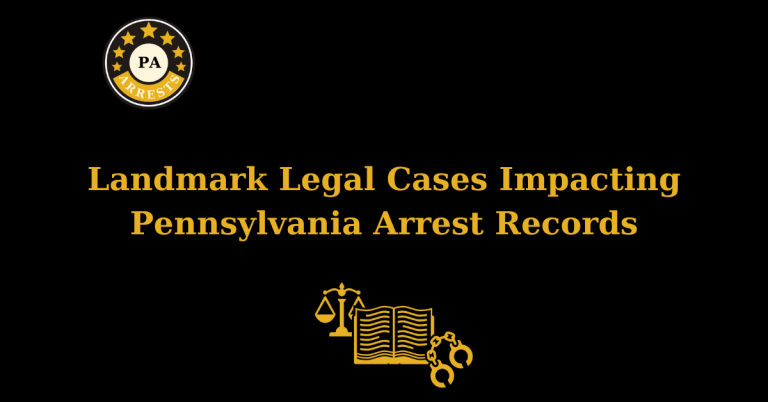Law Enforcement Agencies in Pennsylvania: An In-Depth Guide

With a rich history and a commitment to public safety, Pennsylvania Law Enforcement is dedicated to serving and protecting the residents of the Keystone State. As a comprehensive guide, we aim to provide a valuable resource for individuals interested in learning more about the various aspects of law enforcement in Pennsylvania.
From the dedicated men and women who wear the badge to the intricate systems that ensure justice is served, our guide covers it all. Whether you’re a law enforcement professional seeking to expand your knowledge or a citizen looking to understand the inner workings of the criminal justice system, our comprehensive guide is here to inform and educate.
Exploring Different Law Enforcement Agencies
Discover the diverse range of law enforcement agencies operating within Pennsylvania. From local police departments to state troopers and federal agencies, learn about the roles and responsibilities of each organization. Gain insight into the specialized units and the training required for various law enforcement careers.
The Criminal Justice System
Delve into the inner workings of Pennsylvania’s criminal justice system. Explore the roles of prosecutors, defense attorneys, judges, and other key players in ensuring justice is served. Understand the steps involved in the legal process, from investigation and arrest to trial and sentencing. Gain a comprehensive understanding of the rights and protections afforded to both victims and accused individuals.
Community Policing and Crime Prevention
Learn about the community policing initiatives implemented across Pennsylvania. Discover how law enforcement agencies collaborate with communities to reduce crime and improve public safety. Explore the importance of building trust and fostering positive relationships between law enforcement officers and the communities they serve. Gain insights into crime prevention strategies and initiatives that aim to address the root causes of criminal activity.
Emerging Technologies in Law Enforcement
Stay up-to-date with the latest advancements in technology that are transforming law enforcement in Pennsylvania. Explore the use of body cameras, facial recognition software, and predictive analytics in enhancing investigations and improving officer safety. Understand the ethical considerations and privacy concerns associated with these technologies, and how they are regulated within the state.
Maintaining Public Safety in Challenging Times
Gain an understanding of the unique challenges faced by law enforcement agencies in Pennsylvania. Explore the impact of societal issues such as substance abuse, mental health, and domestic violence on public safety. Learn about the proactive measures taken by law enforcement agencies to address these challenges and ensure the well-being of the communities they serve.
Joining the Ranks of Pennsylvania Law Enforcement
If you are considering a career in law enforcement, this section provides valuable information on the requirements, training programs, and recruitment processes for various positions within Pennsylvania law enforcement agencies. Discover the qualities and skills necessary to succeed in this noble profession and learn about the opportunities available for those seeking to make a difference in their communities.
Resources and Support for Law Enforcement Professionals
Access a comprehensive list of resources and support networks available to law enforcement professionals in Pennsylvania. From mental health services to financial assistance programs, explore the resources aimed at promoting the well-being and professional development of those who serve and protect. Stay informed about the latest training opportunities, conferences, and networking events designed to enhance the skills and knowledge of law enforcement professionals.
FAQs
What are the requirements to become a police officer in Pennsylvania?
To become a police officer in Pennsylvania, you must be at least 21 years old, have a high school diploma or GED, and be a U.S. citizen. Additionally, you will need to complete a police academy training program and pass a physical fitness test.
How long does it take to complete the police academy training in Pennsylvania?
The length of police academy training in Pennsylvania varies. It can range from around 19 weeks for basic training to up to 26 weeks for more comprehensive programs. The duration may also depend on the specific academy and its curriculum.
What are the duties and responsibilities of Pennsylvania police officers?
Pennsylvania police officers are responsible for maintaining law and order, preventing and investigating crimes, enforcing traffic laws, and ensuring public safety. They may also respond to emergency situations, provide assistance to the community, and testify in court when necessary.
Are there any specific educational requirements to join specialized units within Pennsylvania law enforcement?
While educational requirements may vary for specialized units within Pennsylvania law enforcement, most units require officers to have a certain number of years of experience as a police officer. Additionally, officers may need to undergo specialized training specific to the unit they wish to join.
What is the process for filing a complaint against a Pennsylvania police officer?
If you wish to file a complaint against a Pennsylvania police officer, you can typically do so by contacting the Internal Affairs Division of the respective police department. They will guide you through the complaint process, which may involve providing a written statement and any supporting evidence.
What are the consequences of breaking Pennsylvania law enforcement regulations?
Breaking Pennsylvania law enforcement regulations can lead to disciplinary action, which may include suspension, termination, or other appropriate measures. The severity of the consequences depends on the nature and severity of the violation, and they are determined on a case-by-case basis.






